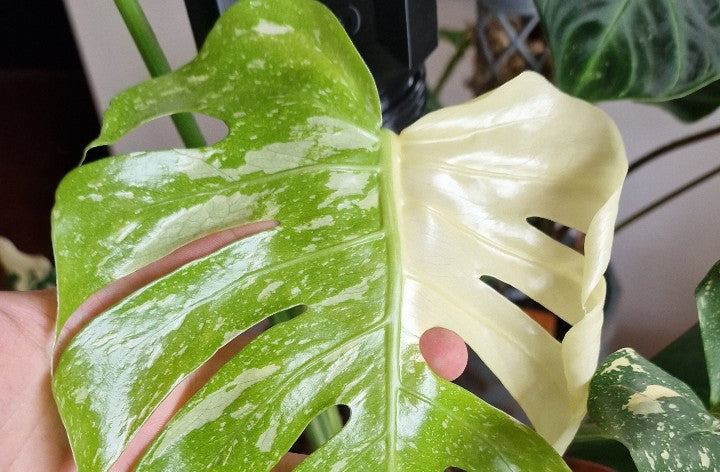
Variegation, Albo, Thai constellation : common plant variants explained
Share
Do you sometimes wonder what Albo means when plant shopping, or why variegated plants are so popular? Or who the Monstera Thai Constellation costs so much?
Variegation, Albo, and Thai Constellation refer to different types of plant variations, and they can be straightforward to recognise, or more tricky to determine.
As they refer to the plant's foliage and leaves, how these different traits show up depend on plant health, size etc.
Read on for a quick guide to them all, plus some tips for when you are plant shopping!

Variegation in houseplants
- Definition: Variegation refers to differently coloured zones or patches in the leaves of a plant. These variations can manifest as stripes, spots, or marbled patterns, creating a visually appealing and fresh look. They can be half-moon (pictured above) or go across the entire leaf, and they can often completely transform a plant! (Half-moon is a term that refers to half the leaf). A variegated version of a common indoor plant can make an average plant into something really special.
- Causes: Variegation can be a result of genetic factors, mutations, or environmental conditions. In some cases, it is a natural occurrence, while in others, it may be intentionally bred or selected.
- Examples: Many plants naturally exhibit variegation, and it can be found in both indoor and outdoor plants. Pothos has some great neon variegation and syngoniums (pictured above) have some beautiful variegation that are becoming very popular, especially the pastel shades and the mottled Mojito!

Albo variants of plants
- Definition: Albo is a prefix commonly used in the plant community to indicate white or pale-coloured variegation. When you see a plant with "albo" in its name, it typically means that the variegation in its foliage is predominantly white. It is common to have a few Albo leaves, or half-moon Albos, whereas fully, fully (all-white) Albo plants are a lot rarer.

- Examples: The Monstera deliciosa 'Albo Variegata' is a popular Monstera known for its white-variegated leaves, but there are also lots of Philodendrons with Albo variegation such as the popular White Princess and White Knight.

Thai Constellation: the Monstera marvel
- Definition: Thai Constellation is a specific type of Monstera deliciosa, known for its unique variegation pattern. The leaves of the Thai Constellation Monstera are characterised by creamy-white splashes and splotches, resembling constellations or star maps, pictured above.
- Features: Thai Constellation Monstera is highly sought after for its aesthetic appeal. The variegation is irregular and can cover a significant portion of the leaf surface. The combination of dark green and creamy-white makes it a striking and distinctive plant.
- Cultivation: Due to its popularity, Thai Constellation Monstera may be more challenging to find, and it's a lot more expensive than the standard Monstera deliciosa. It is often grown as an indoor plant but requires appropriate care to maintain its variegation.
Spotting a "fake" variegated plant
When buying one of these plants, you will want to ensure that the variegation you are getting is "genuine" and will last as the plant grows. As variegated plants have a higher price tag, it is tempting for people to overstate a variegation, or in extreme cases, even fake it.
- Look at the roots of the plant: real variegation will show up there, as well as in the leaves.
- Buy from a reputable seller, and if it is a cutting, try to see the parent plant too. It is better to get a variegation from a more mature plant that has it clearly established.
- Albo variegation can be mixed in with other variegations, and some of the more popular types can be hybrids.
- When buying a plant, it can be very easy to get drawn in by the "look" of a plant, but healthy plants are not always "showy" or "colourful". Consider before you buy an expensive variegated plant. They are super fun to collect, and we love them too, but we also try to be mindful with purchases like these.
Reversion
Variegations can revert. It could be that plant was not very well to start with, or that it is under stress (over or under-watering, too much light/too little light).
Reversions are not always permanent, so don't lose hope if your plant suddenly gets more plain. Wait it out, treat it well, and it may come back.
If the variegation goes for good, it could be that it was never very well-established anyways.



